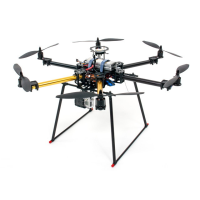San Jose Police Sort of Apologize for Sneaking in a Drone without Public Approval
 Century NEO 660 V2 hexacopter
Century NEO 660 V2 hexacopter
The San Jose Police Department apologized this week for “not doing a better job of communicating” to the public its purchase of an unmanned aerial vehicle (UAV), popularly known as a drone.
The communication misstep included slipping the initial purchase into a November City Council consent agenda item that no one reads, much less debates, according to the San Jose Mercury News. The $7,000 purchase was quietly made in January using federal Homeland Security grant money from a program initially targeted at homeland security, not local policing.
In March, Police Chief Larry Esquivel belatedly signed off on the purchase, including a statement that his approval was contingent on the City Attorney approving it, according to public records obtained through a FOIA request by MuckRock. The documents, released this week, also indicate the purchase was to be contingent on having public outreach and a drone policy in place.
None of that happened.
San Jose police officials probably didn’t break any laws when they quietly purchased the camera-equipped Century NEO 660 V2 hexacopter. But they knew that law enforcement purchase of drones was a contentious issue in California and nationally.
The Los Angeles Police Department (LAPD) let the feds lock up their two newly-purchased drones in June after an uproar. They had picked up the drones from Seattle before they were run of town. Sheriffs in the nearby counties of Alameda and San Mateo made a play for drones last year, both of which ended after noisy objections were raised.
The Federal Aviation Agency (FAA) says about 80 agencies had them in 2013. The FAA knows this because it requires agencies to receive some measure of approval from it to fly the friendly skies. Ars Technica noticed in the MuckRock documents that the San Jose police don’t know this. A March memo from Western Division Commander James Randol to SJPD’s Deputy Chief David Hober states, “The UAV is not a drone. Drones are regulated by the FAA. The FAA doesn’t regulate our device.”
FAA spokesman Ian Gregor told Ars Technica otherwise. “Anyone who wants to fly an aircraft—manned or unmanned—in US airspace needs some level of authorization from the FAA to ensure the safety of our skies,” he said.
The San Jose police press release indicated it was going to start its outreach now and develop policies and procedures for using the drone. The American Civil Liberties Union (ACLU) of Northern California said the department was getting ahead of itself:
“With the history of police abuses in San Jose, the question should not be how to deploy a drone, but rather whether or not a drone should ever be used in San Jose. The San Jose City Council needs to bring the drone issue back for a proper public debate and a new vote.”
Drone critics are concerned about privacy threats posed by a robot that provides completely surreptitious surveillance that a helicopter could never perform. Drone information gathered about civilians not suspected of a crime can be combined with other technology—GPS, facial recognition software, infrared night vision cameras, or microphones to record personal conversations—and stored in linked databases forever.
The apology sends a mixed message about what the department plans to do with the drone. After saying it was purchased primarily “to access potential explosive devices and avoid exposing police bomb squad personnel to possible hazards,” the department suggested another possible use: the all-encompassing threat to “public safety.”
State lawmakers hoping to avoid some of the ambiguities afflicting the San Jose Police Department decision-making process, have introduced Assembly Bill 1327. The legislation requires public agencies to let the public known when it buys drones. They would also have to destroy most drone-collected information within a year and couldn’t put weapons on their flying bots unless the federal government says they can.
The information collected would have to be made available for disclosure unless it wasn’t. An agency could withhold release if doing so would interfere with an investigation. The bill is under consideration in the Senate after passing the Assembly in January.
–Ken Broder
To Learn More:
San Jose Police Department Says FAA Can’t Regulate Its Drone Use (by Cyrus Farivar, Ars Technica)
San Jose: Police Apologize for Drone Secrecy, Promise Transparency (by Robert Salonga, San Jose Mercury News)
San Jose Police: We Regret Secrecy About Drone (by Vivian Ho, San Francisco Chronicle)
Time for a New Vote on San Jose Police Drones (American Civil Liberties Union)
LAPD Acquires 2 Drones, Promises to Barely Use Them and Won’t Call Them Drones (by Ken Broder, AllGov California)
Statement Regarding Purchase of Unmanned Aerial System (UAS) (San Jose Police Department)
FOIA Drone Documents (MuckRock)
- Top Stories
- Controversies
- Where is the Money Going?
- California and the Nation
- Appointments and Resignations
- Unusual News
- Latest News
- California Forbids U.S. Immigration Agents from Pretending to be Police
- California Lawmakers Urged to Strip “Self-Dealing” Tax Board of Its Duties
- Big Oil’s Grip on California
- Santa Cruz Police See Homeland Security Betrayal in Use of Gang Roundup as Cover for Immigration Raid
- Oil Companies Face Deadline to Stop Polluting California Groundwater





